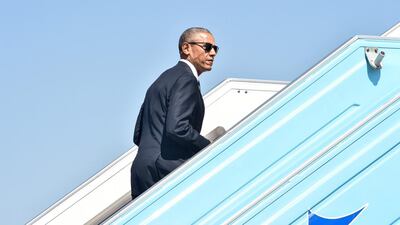Anger in some parts of the Arabian Gulf over a new US law, the Justice Against Sponsors of Terrorism Act (Jasta), is understandable. But the energy being squandered complaining would be much better spent on the lively prospects for finding a solution.
Jasta allows Americans to sue foreign governments over the deaths of Americans killed in terrorist attacks on US soil. It’s mainly intended to allow the families of the victims of the September 11, 2001 terrorist attacks to sue the Saudi government and officials over alleged complicity in the atrocities.
Such legal cases have been routinely dismissed because of “sovereign immunity”, the pillar of international law and relations whereby all countries agree that other governments and their officials can’t be sued or prosecuted for their official conduct.
It’s strange that Congress would initiate the scrapping of sovereign immunity as an inviolable principle when the United States has an unrivalled global role, and is therefore uniquely vulnerable to legal challenges, and even prosecutions.
Because of the dangers he outlined in a strongly-worded “veto message”, Barack Obama rejected Jasta. But last week the US Congress overwhelmingly delivered the first veto override of his presidency.
For the United States, Jasta is a proverbial Pandora’s Box: irresistibly attractive but potentially catastrophic.
American officials could find themselves hauled before judges around the world regarding drone strikes, covert operations, other military actions or anything else another country deems illegal. Moreover, the US government and its officials could even be held responsible for the actions of private American citizens, organisations or companies.
How did this fiasco happen? Why did the US Congress insist on delivering this self-inflicted wound?
It’s partly timing. The original Jasta vote and the veto override both came just a few weeks before the November 11 elections, when many politicians will be facing their constituents. Campaigning under a cloud of having “denied September 11 victims their day in court” is certainly terrifying, and perhaps unthinkable, for many American politicians. The only senator who voted against the veto override, Harry Reid, is retiring.
It’s partly partisan politics. Republicans welcomed the opportunity to deliver the first and probably only veto override of Mr Obama’s presidency. Democrats can tell voters they love the president but “bravely” stood up to him on this issue. And both can boast that they faced down a supposedly mighty “Saudi lobby”.
And partly it’s tension between two rival branches of government. The White House called the veto override the “single most embarrassing thing that the United States Senate has done” in decades.
Almost to confirm this, on the very same day they voted, 28 senators also issued a letter expressing precisely the same concerns Mr Obama had outlined about Jasta’s “potential unintended consequences”.
The outpouring of what the White House aptly called “buyer’s remorse” regarding Jasta was almost instantaneous. Many American politicians are apparently determined to try to “fix” Jasta through additional legislation soon after the election, maybe even in November.
Republicans, knowing they have to correct this potential disaster, are blaming Mr Obama and a supposedly egregious “failure to communicate” by the White House. They claim no one ever warned them about threats to American national interests posed by Jasta, that they couldn’t get a meeting with the White House about it, and their calls were not returned.
They’d have us believe they were blissfully unaware of the implications when they voted for the veto override, only to suddenly discover, a few hours later, all these unimagined but dire perils.
Think about it: Republicans are actually denouncing Mr Obama for failing to successfully block a bill that they not only supported, but also dramatically defended through the first veto override in almost eight years. That’s genuinely funny.
But Democrats are complaining too. Nancy Pelosi, the House minority leader, insists she was never contacted about marshalling sufficient votes to sustain the veto. That’s less amusing.
Dismay over Jasta is widespread in Washington. Therefore, a compromise – which could include limiting the scope and nature of legal action, creating an adjudicating tribunal, restoring an executive waiver, or somehow otherwise limiting the effect and implications of the act – is achievable.
Plaintiffs’ lawyers clearly understand this. The act could effectively outsource foreign policy decision-making to lawyers who exploit the discovery process, demand the release of sensitive information, and create diplomatic crises to try to win summary judgments and make money. These lawyers are scrambling to file legal cases against Saudi Arabia before any additional legislation limits their options.
Instead of wasting time venting outrage, Saudis, their friends and all serious people, should promote compromise legislation, which would be in everybody’s interests, by focusing on the significant threats Jasta poses to American national interests.
Hussein Ibish is a senior resident scholar at the Arab Gulf States Institute in Washington
On Twitter: @ibishblog


